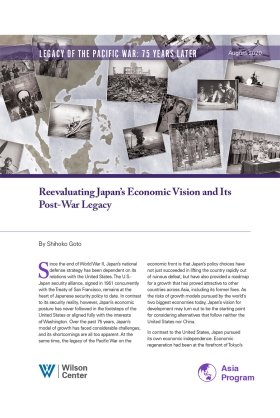Reevaluating Japan's Economic Vision and Its Post-War Legacy



Over the past 75 years, Japan’s model of growth has faced considerable challenges, and its shortcomings are all too apparent. At the same time, the legacy of the Pacific War on the economic front is that Japan’s policy choices have not just succeeded in lifting the country rapidly out of ruinous defeat, but have also provided a roadmap for a growth that has proved attractive to other countries across Asia, including its former foes.
In this report, Shihoko Goto analyzes Japan’s post-World War II experience with economic revitalization and the fundamental reshaping of its strategic orientation towards the United States in the modern era, a Pacific War impact that remains vital to understanding the region today. As Goto argues, over the past 75 years, Japan’s model of growth has faced considerable challenges, and its shortcomings are all too apparent. At the same time, the legacy of the Pacific War on the economic front is that Japan’s policy choices have not just succeeded in lifting the country rapidly out of ruinous defeat, but have also provided a roadmap for growth that has proved attractive to other countries across Asia, including its former foes. In the contemporary era, the Japanese vision for development that it pursued in the aftermath of the Pacific War may turn out to be the starting point for considering alternatives that follow neither the United States nor China.
This article is part of the Asia Program’s Legacy of the Pacific War series.


The Indo-Pacific Program promotes policy debate and intellectual discussions on US interests in the Asia-Pacific as well as political, economic, security, and social issues relating to the world’s most populous and economically dynamic region. Read more
